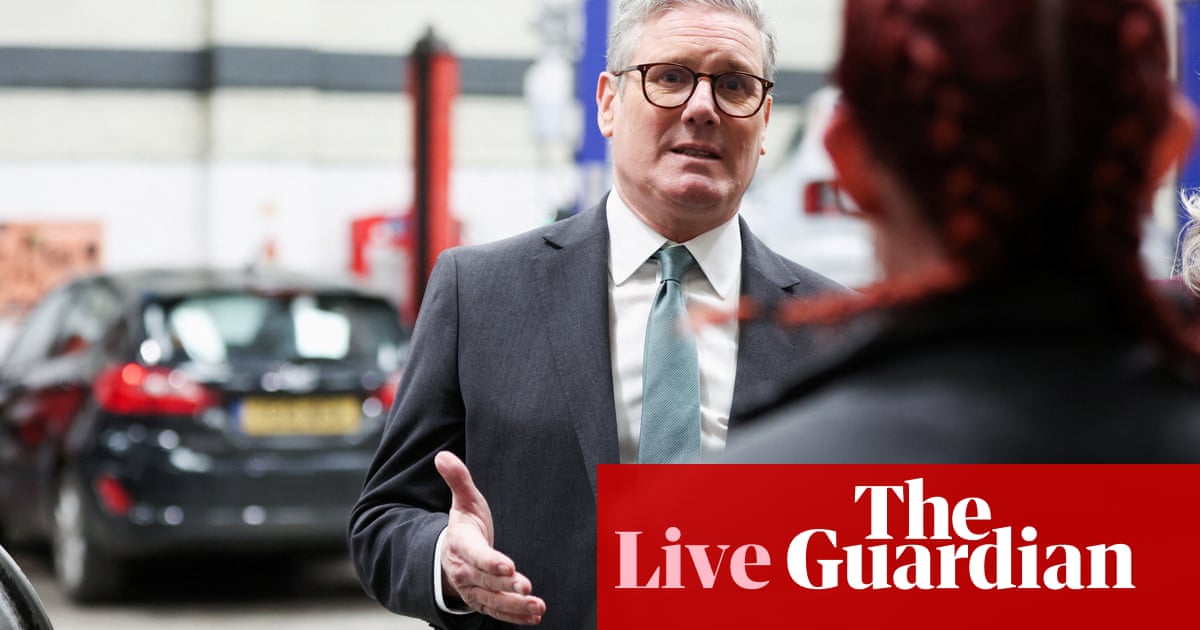No 10 declines to hit back at Trump’s special envoy who claimed Starmer’s Ukraine policy amounts to posturing
Downing Street has refused to respond directly to the claim from President Trump’s special envoy Steve Witkoff that Keir Starmer’s stance on Ukraine amounts to “posturing”.
Asked if Starmer was happy for one of Trump’s closest advisers to be talking in these terms, the PM’s spokesperson said that Starmer himself has explained in detail why he is working on plans for a “coalition of the willing” to support Ukraine, and why a peace deal would need military underpining.
Asked if Witkoff’s comments came up in the Trump/Starmer call last night (see 12.31pm), the spokesperson said the focus of that conversation was on the economic deal.
Asked if Starmer intended just to ignore the comment, the spokesperson replied:
We’re focused on the outcome here. The prime minister could not be clearer about the role of the coalition of the willing, and the value of it. That’s why we are embarking on three days of detailed operational planning this week.
The prime minister is focused on delivering the right outcome in Ukraine. There’s frequent engagement with President Trump to that end, with shared vision with President Trump in terms of bringing a durable peace in Ukraine.
Asked if the PM would deny that he is posturing, the spokesperson said Starmer was focused on the substance of the operational planning phase of the coalition of the willing.
In his interview, asked about Starmer’s Ukraine policy, Witkoff said:
I think it’s a combination of a posture and a pose and a combination of also being simplistic. There is this sort of notion that we have all got to be like [British wartime prime minister] Winston Churchill. Russians are going to march across Europe. That is preposterous by the way. We have something called Nato that we did not have in World War Two.
Key events
The YouGov poll shows relatively high support for taxing the rich as a policy to improve the public finances. (See 2.18pm.) In an interview with the Today programme this morning, Paul Johnson, director of the Institute for Fiscal Studies, was asked if a wealth tax was a viable option. He replied:
We’re already in a world where taxes are the highest they’ve been in the UK. The chancellor, the government, tied themselves in knots in their manifesto, and they already broke that commitment [not to raise income tax, national insurance or VAT] by increasing national insurance in the autumn. That does mean they’re very unlikely to increase income tax or VAT.
Wealth taxes are difficult to implement. There’s not really any examples around the world of an effective wealth tax. But you can have a go.
You need to be clear what you mean. Do you mean people with £1m or £10m or £100m? Do you want it to be one-off, or do you want it to be annual?
I think the key question here is not for an economist, it’s for a lawyer. Could you actually make this stick? I think there’ll be a lot of very happy lawyers if you tried to this because, obviously, people with £10m have got quite a lot of money to find ways around it.
The key fact, though, is if you want serious money, you have to do, broadly speaking, what the chancellor did back in October. You have to raise one of the big taxes, and she decided to raise national insurance.
Of course, income taxes are rising because we’re having allowances and thresholds frozen for a very long period of time. That’s dragging more and more of our income into income tax, and that’s why we’ve had this historically extraordinary increase in taxes over the last five years, and that increase is continuing over the rest of this decade.
So I think it’s really important to be clear, for those who are asking for increased taxes, this is the biggest period of raising taxes we’ve ever had, or at least we’ve had since the second world war.
Poll suggests it is getting harder for Labour to blame last Tory government for tax decisions it has to take
YouGov has published some polling about attitudes to the public finances which help to illustrate why the challenge facing Rachel Reeves on Wednesday is so difficult.
With government spending under pressure, the Treasury has three option. But the poll shows that all three of them have limited support: cutting spending (25%), raising taxes (18%) and raising borrowing (8%).
Instead, what voters would prefer are the options that seem to be off the table: raising spending (27%), cutting taxes (33%) and cutting borrowing (42%).
Reeves has ruled out raising taxes in the spring statement, and she does not have the scope to increase borrowing (see 10.47am), and so the announcement is expected to focus on cuts.
The poll also suggests it is becoming increasingly hard for Labour to blame the last Conservative government for the decisions it has to take.
And it suggests that, if people are asked what specific policies they would favour to improve the public finances, two specific ideas come top: one popular with leftwingers (taxing the rich) and one popular with the right (cutting immigration and benefits for migrants).
Reform UK choses local councillor and ex-magistrate Sarah Pochin as candidate for Runcorn and Helsby byelection

Peter Walker
Peter Walker is a Guardian senior political correspondent.
Reform UK have selected a local borough councillor to fight the Runcorn and Helsby byelection, seen as a key electoral and organisational test for Nigel Farage’s party.
Sarah Pochin is a former local justice of the peace who has worked in the private sector for companies including Shell and what was formerly Caradon, the building supplies firm, Reform said.
In a potentially good fit for a party recently shaken by internal ructions with the suspension of Rupert Lowe, one of their five MPs, Pochin’s time on Cheshire East council saw her either ejected or suspended from both the Conservatives and the local independent group.
In 2020, she was expelled by the Tories after agreeing to become mayor after being selected by the then-ruling Labour-independent coalition. In 2022, she quit the independents after being suspended for rejoining the Conservative party to vote in its leadership election. It is not known if she supported Liz Truss or Rishi Sunak.
The byelection, the date for which has not been announced, was triggered after Mike Amesbury, the sitting Labour MP, resigned after being given a prison sentence for punching a constituent.
Amesbury was suspended by Labour and lost the party whip in October after a video of the incident on a night out was published online. He was given a 10-week prison sentence, suspended for two years.
While Amesbury won a near-15,000 majority last year, Reform came second and Farage’s party has talked up its chances of taking the seat.
Nigel Farage, the Reform UK leader, said:
Sarah is a great candidate who has enjoyed a successful career in private business and has represented the local community as a magistrate for the past 20 years. She has honourably resigned from that role to fight this by-election for Reform UK. Vote for a lawmaker, not a lawbreaker in Runcorn and Helsby.
At the No 10 lobby briefing, asked if Keir Starmer would be turning down his pay rise as an MP (see 1.07pm), the PM’s spokesperson said MPs receive the pay rise whether they want to or not. But he confirmed that the government is continue with the freeze for ministerial salaries.
No 10 declines to hit back at Trump’s special envoy who claimed Starmer’s Ukraine policy amounts to posturing
Downing Street has refused to respond directly to the claim from President Trump’s special envoy Steve Witkoff that Keir Starmer’s stance on Ukraine amounts to “posturing”.
Asked if Starmer was happy for one of Trump’s closest advisers to be talking in these terms, the PM’s spokesperson said that Starmer himself has explained in detail why he is working on plans for a “coalition of the willing” to support Ukraine, and why a peace deal would need military underpining.
Asked if Witkoff’s comments came up in the Trump/Starmer call last night (see 12.31pm), the spokesperson said the focus of that conversation was on the economic deal.
Asked if Starmer intended just to ignore the comment, the spokesperson replied:
We’re focused on the outcome here. The prime minister could not be clearer about the role of the coalition of the willing, and the value of it. That’s why we are embarking on three days of detailed operational planning this week.
The prime minister is focused on delivering the right outcome in Ukraine. There’s frequent engagement with President Trump to that end, with shared vision with President Trump in terms of bringing a durable peace in Ukraine.
Asked if the PM would deny that he is posturing, the spokesperson said Starmer was focused on the substance of the operational planning phase of the coalition of the willing.
In his interview, asked about Starmer’s Ukraine policy, Witkoff said:
I think it’s a combination of a posture and a pose and a combination of also being simplistic. There is this sort of notion that we have all got to be like [British wartime prime minister] Winston Churchill. Russians are going to march across Europe. That is preposterous by the way. We have something called Nato that we did not have in World War Two.
Reeves signals government won’t end free school meals for infants as part of DfE cost cutting
Rachel Reeves, the chancellor, has said she does not “recognise” reports ministers may means test free school meals.
Asked if free school meals would be means-tested following the spring statement, as a report in the Times suggests (see 8.27am and 11.47am), Reeves told broadcasters:
This government is rolling out free breakfast clubs in all primary schools from April. I don’t recognise those claims that the government are looking at means-testing free school meals.
In fact, this government are ensuring that all children get a good start to the day with a breakfast club, helping working parents and helping all children get a good start in life. That is what this government is determined to do after 14 years of Conservative failure.
At the Downing Street lobby briefing the PM’s spokesperson also said that he did not “recognise” the reports. Asked what exactly this meant, and if he could confirm the government was ruling out means testing school meals currently free to all infant pupils, the spokesperson declined to elaborate.
But later a source said Reeve had given a clear indication that the proposal as reported was not one being considered.
Trump and PM discussed trade deal last night, No 10 says, without revealing if digital services tax concessions featured
Keir Starmer and Donald Trump spoke about a UK-US economic prosperity deal in a call last night, Downing Street said this morning.
At the lobby briefing, asked about reports that the government may cut the digital services tax, to help US tech firms and to persuade the White House to reduce the impact of tariffs on the UK in return, the PM’s spokesperson replied:
Firstly, just taking a step back, the UK is working with the United States on an economic prosperity deal, building on our shared strength of that commitment to economic security.
As part of those discussions, the prime minister and President Trump discussed progress made in those discussions last night.
The UK will only do a deal in the national interest, which reflects this government’s mandate to deliver economic stability for British people.
The spokesperson did not say whether or not the digital services tax came up in the call.
But he said the government remained in favour of the tax in principle.
In relation to the digital services tax, the chancellor this morning said that the digital services tax is hugely important.
It brings in around £800m a year and ensures that companies pay tax in the country that they’re operating in. So we will continue to make sure that businesses pay their fair share of tax, including businesses in the digital sector.
On the prospects of a trade deal, the spokesperson said that “good progress” was being made. But he confirmed that what was being envisaged was less a full-blown free trade agreement, and more a deal just covering certain sectors.
Rachel Reeves, the chancellor, has been criticised for accepting two free tickets for a corporate box to see a Sabrina Carpenter concert at the O2 Arena. She went with a family member and, in an interview with the BBC yeserday, she defended accepting the gift on the grounds that her security concerns mean it is difficult for her to attend a concert like that as an ordinary member of the audience. Keir Starmer says he accepts corporate box tickets when he goes to see Arsenal matches for the same reason.
Reeves’s explanation did not impress the Daily Mail, which has splashed on the story this morning.
Asked about the issue in interviews this morning, Heidi Alexander, the transport secretary, wasn’t 100% supportive. She told Times Radio:
I haven’t taken any tickets, to be honest, since I was elected back in [July] as a new member of parliament, and going straight into the Ministry of Justice and then coming straight into the Department for Transport. I actually, sadly, haven’t been to see any concerts at all over the last nine months, partly because I’ve been very, very busy.
As a member of parliament, I have never accepted tickets to any concerts or anything like that.
She also said that, when she did have time off, she would prefer to spend it with her family.
The Independent Parliamentary Standards Authority has confirmed that MPs will get a pay rise of 2.8%, taking their salary in 2025-26 to £93,904. Ipsa proposed this figure last month, and it has now been confirmed following a consultation.
According to the Times, Bridget Phillipson, the education secretary, has floated the idea that the Department for Education might have to stop funding free school meals for all infants (pupils in reception and years one and two) to meet the Treasury’s targets for cuts. But this is seen as a negotiating ploy, more than a serious option, and the Times also says “while moves to axe some policies are likely to be abandoned as politically toxic, they illustrate the scale of the cuts being examined as part of the government’s zero based review of all spending”.
That has not stopped the opposition parties criticising the idea.
Munira Wilson, the Lib Dem education spokesperson, said:
Children cannot be expected to learn on empty stomachs.
If the government go ahead with this, they should hang their heads in shame as they slash free school meals, while giving a tax cut to Musk and other tech billionaires.
And Pete Wishart, the SNP’s deputy leader at Westminster, said:
Reports that the Labour government is planning billions of pounds of austerity cuts to public services, and could even end universal free school meals for infants, will send alarm bells ringing in Scotland and it shows the Labour Party can’t be trusted to protect families.
Keir Starmer had taken part in a pothole-related photocall this morning. But, instead of actually pointing at a pothole like someone auditioning for a slot in Angry people in local newspapers (see 8.27am), he instead visited a garage where mechanics fix the damaged caused by potholes.
As PA Media reports, being shown damage to tyres caused by potholes, Starmer said: “It’s really irritating, if you’re doing the school run or you’re using your car or your van for work.”
The PM also said there needs to be “accountability” in the system of fixing potholes.
While speaking to two members of the public who have been affected by pothole damage, Starmer was told that budgets for fixing the holes are “the wrong way around”. Starmer replied:
The first thing we need to do is to get a bit of accountability into it to know which councils are doing what where.
He said today’s announcement would “incentivise” councils to “get on and do it”.
In his Radio 5 Live interview this morning Starmer said fixing potholes “isn’t boring”. (See 8.34am.)
Photograph: Chris Radburn/Reuters
Pip cuts will make UK less resilient in event of future pandemic, Covid-19 Bereaved Families for Justice UK says
The Covid-19 Bereaved Families for Justice UK group is urging Rachel Reeves to abandon the plans to cut Pip (the personal independent payment, a disability payment). It has explained why in an open letter to the chancellor that it says is backed by almost 10,000 relatives of people who died during the pandemic.
Here is an extract.
Rampant inequality also contributed to the UK’s high death toll. Disabled people were 11 times more likely to die from Covid-19 than non-disabled people. Instead of addressing the inequalities that contributed to that horrifying statistic, the government is pushing ahead with plans to slash disability benefits, driving more people into poverty and making the country even less prepared for future pandemics. A broken safety net doesn’t just fail individuals – it weakens society’s ability to respond to a crisis.
The full letter has been posted on social media.
Disabled people were 11x more likely to die from COVID-19 than non-disabled people.
Cuts to welfare and public spending more widely led directly to avoidable deaths when the pandemic hit.
That is why we have written to Chancellor @RachelReevesMP urging her to cancel the cuts. pic.twitter.com/15Uytl9Ge4
— Covid-19 Bereaved Families for Justice UK (@CovidJusticeUK) March 24, 2025
If you are wondering why, as an alternative to cutting spending in areas like disability benefits and overseas aids, Rachel Reeves does not just revise her fiscal rules and borrow a bit more, you should read this by Alex Clark and Richard Partington. It explains, with clear, interactive graphics, how government borrowing costs have soared over the past decade, leading to a huge rise in the proportion of government spending going on debt repayments.
Transport secretary Heidi Alexander declines to say Heathrow bosses right to close airport after substation fire
Heidi Alexander, the transport secretary, was doing an interview round this morning. She may have been hoping to talk about potholes, but mostly she faced questions about the closure of Heathrow on Friday after an electricity substation was knocked out by a fire. Here are some of the main lines from her interviews.
-
Alexander said said she would have struggled to sleep if she were running Heathrow airport during last week’s power outage. She was responding to reports that Thomas Woldbye went back to bed after the crisis began late on Thursday night. Asked if she would have done the same, Alexanderm who was in charge of transport in London as a deputy mayor for three years, told LBC:
I’ve had to deal with some pretty stressful situations in my time. I probably would struggle to sleep, to be honest.
But she also stepped back from being explicitly critical of Woldbye’s decision, saying:
It’s my understanding that he placed his chief operating officer in charge. He will have also known that there was going to be a huge number of very difficult decisions the following day.
I’m not going to justify decisions that Heathrow leadership did or didn’t take. I wasn’t sat at the table. I didn’t have the information that he had available to him at that time.
The decision to close the airport on Friday was a decision taken by Heathrow’s management.
Pressed on whether she thought that was the correct decision, she replied:
I don’t have all the information that they had available at the point in time when they made that decision.
In another interview, on BBC Breakfast, asked if she had full confidence in Heathrow management, she replied:
That’s not a matter for me. The individuals who need to ask themselves whether they have full confidence in Heathrow management are the Heathrow board …
Heathrow is a private company. Decisions about the leadership of that company are matters for its own board.
-
She said that, although Heathrow had back-up generators, they were “designed to protect the critical systems within the airport not to power the entirety of the airport” because it consumed “roughly the amount of energy that a small city would consume”.
I had a conversation with the chief executive of Heathrow on Friday morning. He told me that whilst there are multiple power supplies into the airport, the fire had created a very significant problem with respect to Terminals 2 and 4 specifically and that there had to be some reconfiguration of power supplies into the airport.
That meant all the systems had to be turned off and all the systems had to be restarted again in a safe way.










